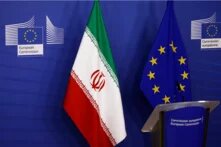Feminist Foreign Policy
Articles
More articles about Feminist Foreign Policy (27)
Publications
More pages about Feminist Foreign Policy
© Heinrich-Böll-Stiftung e.V.
Schumannstraße 8
10117 Berlin
T +49 (30) 285 34-0
F +49 (30) 285 34-109
www.boell.de
info@boell.de












